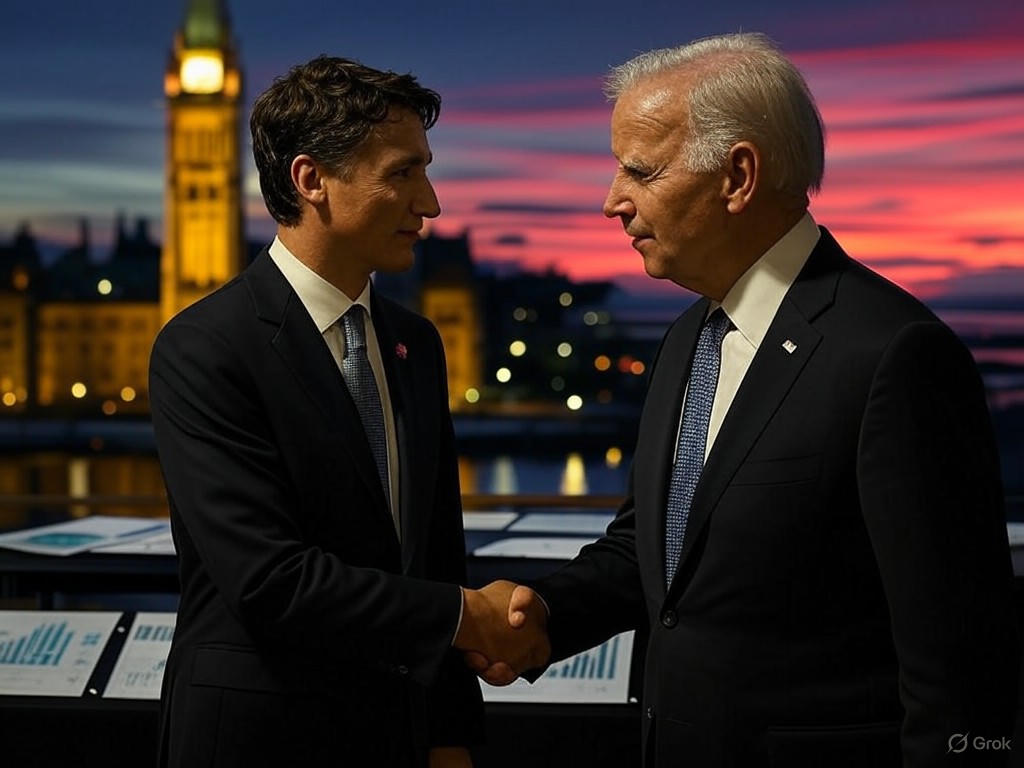US Tech Taxes: Canada’s Response Shakes Global Markets
In the intricate dance of international commerce, where digital innovations forge the backbone of modern economies, the shadows of discord often loom large. Picture the sun-kissed harbors of Vancouver, British Columbia, alive with the hum of tech startups and data centers, now caught in the crosswinds of a brewing storm between Ottawa and Washington. As the United States accuses Canada of imposing unfair tech taxes, the ripple effects threaten not only the vibrant economy of BC but also the fragile equilibrium of global tech markets. This editorial advocates for diplomatic resolutions over confrontation, emphasizing free-market principles and limited government intervention to foster innovation and stability. Through measured dialogue, nations can preserve the open exchange that has long driven prosperity, rather than entrenching barriers that stifle growth.
The Roots of the Dispute: Accusations and Responses in Canada-U.S. Tech Taxes
At the heart of this contention lies the U.S. claim that Canada's digital services tax—levied on tech giants like Google and Amazon—unfairly targets American companies, contravening international trade norms. Enacted in 2021 as part of Canada's broader efforts to capture revenue from the digital economy, this tax applies to revenues generated from Canadian users, regardless of where the company is based. Critics in Washington argue it discriminates against U.S. firms, potentially violating the Canada-U.S.-Mexico Agreement (CUSMA). In response, Ottawa has defended the measure as a necessary step to ensure fair taxation in an era where tech behemoths often evade local levies through complex global structures.
For British Columbia, a province that has positioned itself as a tech hub with companies like Hootsuite and electronic arts firms thriving in Vancouver, these accusations carry immediate weight. BC's economy, buoyed by tech exports and foreign investment, could face retaliatory tariffs or reduced market access if tensions escalate. According to a Wall Street Journal analysis, such disputes could shrink BC's tech sector by as much as 5% in the short term, dampening job creation and innovation. Yet, Canada's measured response—emphasizing negotiation through forums like the OECD—highlights a pragmatic path forward. This approach aligns with center-right values, prioritizing free-market access over heavy-handed regulations that might entangle businesses in bureaucratic webs.

The illuminated skyline of Vancouver, symbolizing British Columbia's role as a gateway for tech innovation, now shadowed by the uncertainties of international trade disputes.
Analyzing the Impact: British Columbia and the Global Tech Economy
The fallout from this tech tax row extends beyond bilateral relations, influencing the broader tapestry of global markets. In British Columbia, where tech taxes intersect with local economic realities, the sector accounts for nearly 10% of the province's GDP, driven by exports to the U.S. that topped $5 billion in 2023 alone. If U.S. accusations lead to trade barriers, BC could see a slowdown in foreign direct investment, as companies hedge against uncertainty. This is not merely a matter of dollars and cents; it strikes at the core of traditional values like entrepreneurship and self-reliance, which thrive in environments of open borders and minimal interference.
Globally, the dispute underscores the challenges of harmonizing tax policies in a digital age. While the U.S. pushes for a unified approach through organizations like the G7, Canada's stance reflects a commitment to sovereignty without overreaching government control. A IEEE Spectrum report warns that escalating tensions could fragment tech supply chains, potentially increasing costs for consumers and delaying innovations in areas like artificial intelligence and cloud computing. From a center-right lens, this scenario highlights the perils of protectionism: governments should facilitate, not dictate, market dynamics. Diplomatic channels, such as ongoing talks under the U.S.-Canada Trade and Economic Council, offer a venue for resolving these issues without resorting to the kind of regulatory overreach that stifles competition.
Yet, balance demands acknowledgment of the U.S. perspective. American officials argue that unilateral taxes like Canada's distort free markets, giving domestic firms an edge. This viewpoint, echoed in a Brookings Institution blog post, suggests that without international consensus, such measures could lead to a tit-for-tat escalation, harming all parties. In BC, where cross-border tech collaborations are commonplace, the risk is palpable: a decline in joint ventures could erode the province's competitive edge, affecting everything from software development to hardware manufacturing.
Evidence and Economic Stakes: Weighing the Costs of Escalation
Evidence from recent trade skirmishes paints a cautionary picture. Historical precedents, such as the 2018 U.S.-China tech tariffs, demonstrate how disputes can lead to supply chain disruptions and reduced innovation. In Canada, a Financial Times article estimates that a full-blown trade war over tech taxes could cost BC upwards of $2 billion annually in lost exports, disproportionately hitting small and medium-sized enterprises that lack the resources to navigate geopolitical turbulence. These firms, the lifeblood of free-market economies, rely on seamless Canada-U.S. trade to compete globally, underscoring the need for diplomatic restraint.
Moreover, data from Statistics Canada reveals that tech taxes have generated modest revenue—around $500 million in 2023—while potentially alienating key investors. This raises questions about the efficacy of such policies: Is the pursuit of fiscal sovereignty worth the economic isolation? From a pragmatic standpoint, center-right principles advocate for alternatives like bilateral agreements that promote transparency without imposing burdensome regulations. As negotiations progress, the focus should remain on mutual benefits, ensuring that BC's tech sector continues to flourish as a model of market-driven success.

A symbolic handshake between U.S. and Canadian officials during trade talks, representing the potential for diplomacy to resolve tech tax conflicts and preserve economic ties.
A Path Forward: Advocating for Diplomatic Resolutions
In conclusion, Canada's response to U.S. tech tax accusations presents a pivotal moment for British Columbia and the global economy. By prioritizing diplomacy over discord, Ottawa can safeguard BC's tech prowess while upholding free-market ideals that have long fueled prosperity. The evidence is clear: escalation risks unnecessary harm to innovation and trade, whereas collaborative efforts through established channels could yield equitable solutions. As we envision a future where digital frontiers expand without the fetters of excessive government intervention, let us remember the enduring value of negotiation. In the spirit of traditional commerce, where handshake deals and mutual respect prevail, Canada and the U.S. can chart a course that benefits all—ensuring that the tech economy remains a beacon of opportunity, not a battleground of division.

